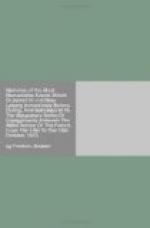Had any of the allied corps succeeded this day in penetrating on any side into our city, nothing less than the total destruction of the French army would probably have been the consequence; since it might from this place, as from the centre of the field of battle, have fallen upon the rear of any part of the French force, and have hemmed in both the centre and the wings. This misfortune Napoleon had taken good care to prevent. He now felt, however, that his strength was broken, and that he was no longer in a condition to maintain the contest. He resolved upon retreat, but carefully sought to conceal this intention from his enemies. Though night had come on; yet the cannon thundered as furiously as in the morning, and the fire of musketry was brisker than ever. A long column, with an endless train of artillery, was seen defiling from Probstheide to Konnewitz. Again I trembled for the cause of the allies. These, I imagined, were the French guards, marching to the attack of the right wing. Now methought the moment had arrived when Napoleon would strike the decisive blow, which he had so often deferred till the very last hour. Soon afterwards the cannonade seemed to gain redoubled vigour, and continued an hour without intermission, so that every house in the city was shaken. As, however, it at length ceased without removing to a greater distance, we naturally concluded that this last attack had proved unsuccessful. More than ten great conflagrations illumined the whole horizon amid the obscurity of night.
The excessive bustle in the city rendered it impossible for us to observe that the retreat had in fact commenced. The greatest part of the persons attached to the army had already left the city, while the others were making all the requisite preparations for their departure. Most of them had wonderfully changed the tone in which they had spoken the preceding day. They now talked of the miseries of war, deplored the sufferings of the people, and declared that peace would be the greatest of blessings for all parties. The multitude of French officers here was so great, that even those of high rank on the staff were obliged to put up with the most wretched accommodations, for which they paid handsomely, leaving their horses and equipages in the street, where the former frequently ran away. One of these officers sought a night’s lodging in a mean house in the author’s neighbourhood. He was called up at midnight, and informed that his column had just begun to retreat. He inquired whether the whole army was doing the same—the messenger replied that he did not know. This circumstance first confirmed my belief that the French had sustained a defeat, and rendered the conjecture that their whole army was retreating highly probable. Many French employes and soldiers had, several days before, while they yet had an opportunity, exchanged their uniform for the plainest attire, that, under this peaceful aegis, they might the more calmly await




